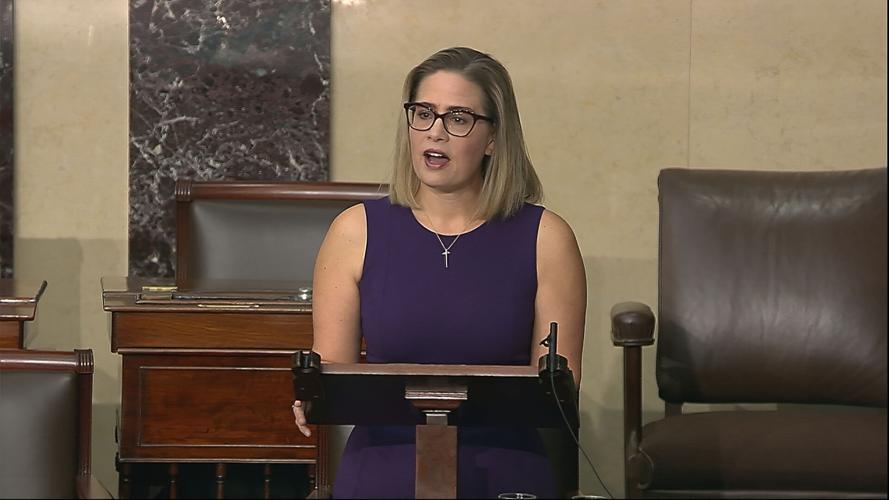Sen. Kyrsten Sinema points to the angry divisions in our country as one of our top problems, and she’s not wrong.
That’s one of the main points the Arizona Democrat made in a high-profile speech last week announcing her approach to two voting-rights bills in the U.S. Senate. She was right that we need to re-learn how to bridge our differences, not demonize our opponents, and come to compromise solutions.
But her logic fails her in the current context of voting rights bills blocked by the Senate’s 60-vote filibuster.
She’s wrong to think that polarization is what’s causing efforts to limit voting rights. And that makes her wrong in her approach to the filibuster itself, which she is obstinately upholding in its most draconian, impractical form, rather than pushing to change it.
This week, the pressure mounts again on Sinema as the Senate’s majority leader, Sen. Chuck Schumer, tries to push two voting-rights bills through the body divided 50-50, despite unanimous Republican opposition.
One bill, the Freedom to Vote Act, would make Election Day a federal holiday, require at least 15 days of early voting, make mail-in voting mandatory, ban partisan gerrymandering and tighten campaign-finance disclosure requirements, among many changes.
The other, the John Lewis Voting Rights Advancement Act, would restore pre-clearance requirements for election changes in some states, among many other changes. Schumer is trying to combine the bills with a third bill in order to facilitate passage.
Democrats nationwide have been hammering Sinema for the potentially contradictory stand she took last week. She says she supports the voting rights bills but opposes a temporary suspension of filibuster rules that would let them pass on a party-line vote, if all Democrats voted yes.
On Martin Luther King Jr. Day, Martin Luther King III shamed her and fellow Democratic U.S. Sen. Joe Manchin for placing the filibuster on a higher pedestal than voting rights.
“Senator Manchin, Senator Sinema, members of the Senate, pass the Freedom to Vote John R. Lewis Act now,” he said. “If you can deliver an infrastructure bill for bridges, you can deliver voting rights for America.”
“If you do not, there is no bridge in this nation that can hold the weight of that failure.”
It was a stinging commentary. And it probably hurts Sinema that Emily’s List, the group supporting pro-choice female candidates, announced Tuesday it will no longer support her.
But that pressure probably won’t change anything.
That’s because Sinema has wrongly diagnosed the reasons for changes that may make it harder to vote in various Republican-controlled states, including Arizona.
“We must also acknowledge a painful fact,” Sinema said in her speech last week. “The state laws we seek to address are symptoms of a larger, more deeply rooted problem facing our democracy — the divisions themselves, which have hardened in recent years, and have combined with rampant disinformation to push too many Americans away from our basic constitutional values.”
This is wrong. And Sinema indirectly acknowledged that in her speech.
The worst changes in voting laws are not a result of polarization. This isn’t a “both-sides” issue. These changes are an effort to preserve Republican political power, using false claims of election fraud by former President Donald Trump as a justification. It’s about seizing power, not polarization.
This is not to say Democrats are pristine and their bills are perfect. For example, the Freedom to Vote Act would force states to let voters register up to Election Day. That’s a potential major headache for election officials and the political parties and campaigns.
Essentially, with this change, the universe of registered voters would be unknown till after the election. And recorders’ offices would never be able to transition from registering voters to receiving and processing early ballots, as they do now under Arizona’s popular mail-in ballot system.
But more crucial: Sinema’s position in support of the 60-vote filibuster is not creating any compromise on these or other bills. The filibuster is not creating the compromise that Sinema keeps saying it will.
The current filibuster allows any member to use an email to tell the Senate they are blocking a bill, and forces the majority to prove they have the 60 votes to pass it.
Sinema has said for a year that she’s willing to entertain reforms to the filibuster, but she should go beyond openness to reform and push for specific reforms herself. The principle should be that it ought to take effort to block the majority’s will.
Return to a speaking filibuster, which requires those blocking a bill to speak on the floor, as in the old days, instead of just typing an email.
Require those who want to invoke a filibuster to get 41 votes, instead of requiring those who want to pass a bill to get 60. This puts the onus on those standing in the way of the majority.
Ratchet down the number of votes required to pass a bill. This means requiring maybe 60 for a period of days or weeks, then, say, 57 votes, then 54, etc. It would give time and reason for the minority and majority to compromise.
Simply reduce the number of votes required for a filibuster, from 60 to, say, 57 or 55.
If Sinema would assertively pursue any of these reforms, rather than embracing the current, painless way of blocking majority rule, it would be easier to accept her contradictory position on the voting-rights bills.
Instead she’s offering a false diagnosis of the election-law problem and no solution to the Senate’s minority rule.
From her "F--- Off" ring and brightly colored wigs worn on the Senate floor to being bashed on late night television, U.S. Sen. Kyrsten Sinema…







